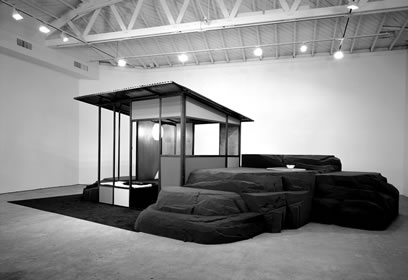< Table of Contents
Western Evolutions: Andrea Zittel at Regen Projects |
By: Margo Handwerker
Installation view at Regen Projects, Los Angeles, December 2004 |
 One of the sharpest shows this winter was Andrea Zittel's, Western Evolutions. Zittel's ingenuous and inexpensive designs for living offered both a revealing and useful take on sedentary life in this century, making clear that the sacrifice of settlement is not made at the expense of comfort or appeal. Conceived against a backdrop of our current socio-political clash between idealism and the reality of existing conditions, Zittel's work offered a compelling reaction to these circumstances from a local perspective rather than a global one.
One of the sharpest shows this winter was Andrea Zittel's, Western Evolutions. Zittel's ingenuous and inexpensive designs for living offered both a revealing and useful take on sedentary life in this century, making clear that the sacrifice of settlement is not made at the expense of comfort or appeal. Conceived against a backdrop of our current socio-political clash between idealism and the reality of existing conditions, Zittel's work offered a compelling reaction to these circumstances from a local perspective rather than a global one.
Western Evolutions pushed to an extreme, resulting in suggestions for living that effectively responded to community-based standards. In the gallery was a glimpse of A-Z West, a testing ground for innovative adaptations to the harshness of the high desert landscape near Joshua Tree National Park: The Homestead Unit. One of the most sensible prototypes is a domestic shelter that Zittel believes might one day be mass-produced. Its modest square footage allows for increased portability.
The structure was accompanied by a diary slide show presentation titled "Sufficient Self," musing on aspects of life and work at A-Z West. Zittel's documentation details such mundane activities as her morning routine: "I start in the morning when I get out of the shower.�Before I can put anything on I have to pick up at least five objects...For each five objects that I pick up, I get to put on one article of clothing. Finally, by the time that I'm completely dressed and ready to walk out the door, the house is also totally cleaned up, too."
Despite their brevity and seeming inconsequentiality, Zittel's explanations are anything but trivial. Together with the images, these captions provide a platform from which Zittel projects the impetus to "blur the line between art and utility," creating systematic solutions to everyday problems like cleaning the house. For all the simplicity of these moments, life attitudes are nonetheless rampant. Most telling of all was Zittel's principle of "Radiating Arenas of Enhancement," about which she states, "you should spend the most energy modifying the things closest to yourself--and then work outwards as resources permit." Moving from systems designed specifically to address her individual circumstances, to living in the high desert, to "living in the world at large," Zittel consistently made recommendations for maintaining our world in the face of overwhelming expenses of energy and resources outside of ourselves.
The exhibition's main component, the A-Z Homestead Unit from A-Z West, surrounded by Raugh Furniture made of sculpted soft charcoal gray foam, which can be carved into seating or storage to accommodate specific living conditions, providing an aesthetically conscious alternative to sprawling subdivisions without second-guessing the necessity for temporary housing in our increasingly transitory lifestyle. Inside, blocks of foam served as eating, sleeping and working space. Tossed on the bed was a Fiber Form Uniform, a sophisticated garment made by "felting" washed and carded wool into the shape of a dress. The clothing was flanked by tools such as eating utensils and light fixtures simply crafted from basic materials. The interior also included a variation on her Raugh Desk, exhibited in the 2004 Whitney Biennial. The desk played with her theory of "natural order," the idea that things belong where you put them most naturally."
With each step around it, the Homestead Unit evinced a popular desire to return to nomadic roots. This assumption affirms Zittel's own belief that "we are most happy when we are moving forward towards something that we have not quite attained." "A lot of systems would work perfectly well, if we would choose to invest energy maintaining them."
 One of the sharpest shows this winter was Andrea Zittel's, Western Evolutions. Zittel's ingenuous and inexpensive designs for living offered both a revealing and useful take on sedentary life in this century, making clear that the sacrifice of settlement is not made at the expense of comfort or appeal. Conceived against a backdrop of our current socio-political clash between idealism and the reality of existing conditions, Zittel's work offered a compelling reaction to these circumstances from a local perspective rather than a global one.
One of the sharpest shows this winter was Andrea Zittel's, Western Evolutions. Zittel's ingenuous and inexpensive designs for living offered both a revealing and useful take on sedentary life in this century, making clear that the sacrifice of settlement is not made at the expense of comfort or appeal. Conceived against a backdrop of our current socio-political clash between idealism and the reality of existing conditions, Zittel's work offered a compelling reaction to these circumstances from a local perspective rather than a global one.